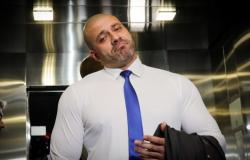
FTX founder Sam Bankman-Fried stepped down as chief executive last week
- author, Joe Tidy
- Roll, From BBC News
- 28 March 2024, 14:35 -03
Updated 3 hours ago
In just eight days, 30-year-old Sam Bankman-Fried, who was nicknamed the “King of Cryptocurrencies”, declared the bankruptcy of his company, FTX, and stepped down as chief executive officer (CEO). This Thursday (28/3), he was sentenced to 25 years in prison for fraud against clients and investors.
The court also ordered the blocking of 11.2 billion dollars from his accounts, the equivalent of R$56 billion at the current exchange rate.
During Thursday’s trial, defense lawyer Marc Mukasey even described his client as just a “clumsy math nerd”, arguing that he was not “a ruthless serial financial killer”, as they claim.
Sam Bankman-Fried himself admitted during the trial that he had made a “series of bad decisions” that “haunt” him every day. However, he stopped short of explicitly apologizing.
The defense also argued that SBF could have resolved the problems at FTX if it had had more time. But Judge Lewis Kaplan rejected all of these claims and said it was “misleading” and “logically flawed” for them to say that FTX customers lost nothing because they would soon be paid in full.
A client who lost US$2.1 million (R$10.5 million) in the collapse also told the court how he lives “the FTX nightmare every day”
SBF was found guilty in 2023 on all seven counts of wire fraud and conspiracy with which it was accused.
Who is Sam Bankman-Fried?
Sam Bankman-Fried enjoyed playing a video game called Storybook Brawl so much that he hired its creator in March
In recent years, the internet has been flooded with lengthy interviews of Bankman-Fried, conducted from his office in the Bahamas.
In some of these videos, you can hear an annoying clicking noise.
As Bankman-Fried tells his incredible story of how he became a billionaire in five years, you hear the insistent, fast-paced sound that seems to be coming from his mouse.
During the interview, the young businessman’s eyes roam the screen.
It’s not clear from the videos what he’s doing on his computer, but in posts on Twitter he revealed the mystery.
“I’m famous (or infamous) for playing League of Legends while on my phone,” he tweeted in February 2021.
Bankman-Fried — now a former director of cryptocurrency exchange FTX — is a compulsive video game player. And in a series of tweets to his nearly one million followers, he explained why. The game served as an escape valve in his stressful daily life, in which he managed two companies that traded billions of dollars a day.
“Some people drink; some people gamble. I play League,” he said.
“I usually sleep on a beanbag,” Bankman-Fried told her Twitter followers
After his cryptocurrency empire collapsed last week in dramatic fashion, another story of his has resurfaced on the internet.
According to a blog post from venture capital giant Sequoia Capital, Bankman-Fried played a League of Legend battle during a high-profile video call with Sequoia’s investment team.
And that doesn’t seem to have angered Sequoia. The group invested $210 million in Bankman-Fried’s FTX.
This week, Sequoia Capital deleted that blog post and announced that it will write off its investment in FTX as a loss.
They are not the only investors who have lost huge sums since the collapse of Bankman-Fried’s $32 billion empire.
FTX had around 1.2 million registered users who used the cryptocurrency exchange to buy cryptocurrency tokens like bitcoin and thousands of other assets.
From large traders to small cryptocurrency enthusiasts, many are now wondering whether they will be able to recover their savings linked to FTX digital wallets.
The dramatic rise and fall of Bankman-Fried is a story filled with bold moves of risk and reward.
Bankman-Fried was a student at the Massachusetts Institute of Technology (MIT) — the famous American university — where he studied physics and mathematics.
But the brilliant student says it was lessons learned in student dorms, not classrooms, that led to his fortune.
In an interview with the BBC last month, he said he had been influenced by the “effective altruism” movement. Effective altruism is a community of people who “try to figure out what they can practically do with their lives to have the greatest possible positive impact on the world,” according to Bankman-Fried.
He says he decided to enter the banking sector to make as much money as possible and put it towards good causes.
He learned to trade stocks for a short time at the New York firm Jane Street before getting bored and moving on to bitcoin.
He noticed that there were wide variations in the value of bitcoin on different cryptocurrency exchanges and began arbitraging — buying bitcoin from places that sold it cheap and selling it elsewhere where it was more expensive.
After a month of modest profits, he got together with college friends and founded a company called Alameda Research.
Bankman-Fried says that his beginnings were not easy, and that it took him months to perfect techniques on how to move money in and out of banks and between countries. Finally after three months, he and his small team hit the jackpot.
“We were very single-minded,” he told the Jax Jones and Martin Warner Show podcast last year. “We just kept moving forward. When an obstacle came up, we got creative and if our system couldn’t handle it, we built a new system to get over it.”
In January 2018, his team was making $1 million a day.
A CNBC reporter recently asked him how he felt in the midst of all this.
Bankman-Fried said it all “made sense” within his methodology. “But it surprised me every day,” he said.
Sam Bankman-Fried officially became a billionaire in 2021 thanks to the second business he founded: FTX. The cryptocurrency exchange has grown to become the second largest in the world and an industry giant, with $10 to $15 billion traded per day.
In early 2021, FTX was valued at $32 billion. The company had become famous among the general American public. The NBA’s Miami Heats basketball stadium is named after the company: FTX Arena. Celebrities such as model Gisele Bündchen and American football star Tom Brady have invested in FTX.
Bankman-Fried seemed happy to show off her lifestyle to her Twitter followers. He mostly sleeps on a beanbag chair next to his desk in the office. A photo shows him sleeping like this, with his team working around him.
Binance CEO Changpeng Zhao traded barbs on Twitter with Bankman-Fried
In another image, in the early hours of the morning, he wrote: “Couldn’t sleep. Back to the office.”
Bankman-Fried’s dream of donating large amounts of money to charity was also well underway. In the BBC interview last month, he said he had already donated “a few hundred million”.
And his generosity didn’t just extend to charities. Over the past six months, the “King of Cryptocurrencies” has been given another nickname: “White Knight of Crypto.”
With the price of cryptocurrencies falling during 2022, the so-called “Crypto Winter” continues. Other companies in the sector began to fail, but Bankman-Fried continued to distribute hundreds of millions of dollars in aid to companies at risk of bankruptcy.
Asked why he was trying to prop up failing cryptocurrency companies, he told CNBC: “It won’t be good in the long run if we have real pain. And it’s not fair to customers.”
He also stated that he had $2 billion in reserve that he could use to help failed cryptocurrency companies.
But last week he was trying to raise money to save his own company and his customers.
Doubts about FTX’s financial stability began to emerge after an article on the website CoinDesk suggested that part of Bankman-Fried’s trading giant, Alameda Research, was financed by a currency invented by an FTX group company, rather than an asset independent.
The Wall Street Journal published allegations that Alameda Research used FTX customer deposits for loans.
The beginning of the end came when FTX’s main competitor — Binance — sold all of its FTX-linked cryptocurrency tokens.
Binance CEO Changpeng Zhao told his 7.5 million followers that his company would sell its holdings in FTX “in light of recent revelations.”
This triggered a panic, with FTX clients withdrawing billions of dollars from the exchange.
Withdrawals were stopped and Bankman-Fried tried to obtain a bailout from Binance, even considering buying the rival.
Binance said reports of “mismanaged customer funds and alleged investigations by US agencies” influenced its decision to back out of a deal with FTX.
The next day, FTX declared bankruptcy.
Bankman-Fried apologized in a series of tweets: “I’m sorry, again, that we ended up at this point.”
“I hope everything can have a way to recover. I hope this can bring some transparency, trust and governance.”
He said he “was shocked to see things unfold the way they did.”
This is the world of cryptocurrencies. The price of bitcoin has fallen to its lowest value in two years and many are now asking: if FTX could go down with its iconic leader, who will be the next to fall?
Tags: King cryptocurrencies sentenced years prison showed remorse terrible crimes
--




